It can be said that Oracle SAP software and Odoo play the role of the “operational brain” of the business – where processes are standardized, data is centralized and information flows are connected throughout. They create a solid foundation for businesses to optimize costs, increase performance, expand scale and make decisions faster.
This article by Bizzi will summarize relevant information about Oracle SAP and Odoo software so that leaders and managers can have an overview of the functions, advantages and make the right choice for their business.
Overview of the Oracle SAP Oddo ERP software ecosystem
To better understand Oracle SAP or Oddo software, let's take a closer look at the products and solutions offered.
SAP – ERP giant for large enterprises
SAP To be ERP software (Enterprise Resource Planning) helps businesses manage all activities such as finance, purchasing, sales, production, human resources, supply chain... on a unified platform.
Main products & target audience:
- SAP S/4HANA – for Enterprise (corporation, large enterprise)
- Next-generation ERP platform, running on HANA in-memory database, processes real-time data.
- Integrating AI, Machine Learning, visual data analysis.
- Suitable for multinational enterprises, complex processes, requiring high scalability.
- SAP Business One – for SME (small and medium enterprises)
- Fast deployment, lower cost, manage core processes: accounting, sales, inventory, CRM.
- Optimized for businesses that need to standardize processes but do not yet need a complex ERP system.
- SAP ECC (ERP Central Component) – for large enterprise, traditional model
- The old ERP version before S/4HANA was born, ran on relational database.
- Stable, many modules, but slower processing, lacks AI/real-time features.
- SAP is recommending customers to gradually migrate to S/4HANA before 2027
Main differences:
- Technology: S/4HANA uses a modern in-memory database, which is faster than ECC (traditional database).
- Object: S/4HANA & ECC serve large corporations, Business One for SMEs.
- Features: S/4HANA supports real-time analytics, AI, intuitive Fiori interface; ECC & Business One are less modern.
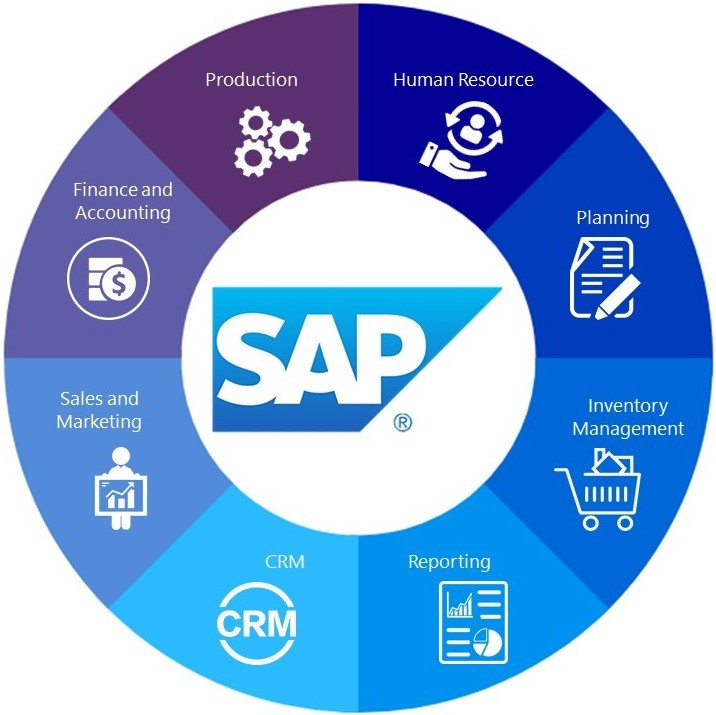
Oracle – The All-In-One Choice for Multi-Industry and Cloud ERP
Oracle ERP Cloud is Oracle's cloud-based ERP solution suite, helping businesses manage finances, purchasing, manufacturing, supply chains, human resources, projects, etc. with real-time updates, flexible expansion, and reduced operating costs compared to on-premise ERP.
Main products:
- Oracle NetSuite ERP – for SMEs (small and medium enterprises)
- Fully cloud-based ERP, fast deployment, easy to scale as business grows.
- Integrated modules: finance - accounting, CRM, inventory, orders, e-commerce.
- Suitable for fast growing businesses that want to standardize processes and optimize IT costs.
- Oracle E-Business Suite (EBS) – for large enterprises and corporations
- Traditional ERP, on-premise or hybrid deployment.
- Provides many specialized modules for industries: finance, SCM, HR, manufacturing, projects.
- Suitable for complex organizations that need to customize internal processes and data.
Key differences:
- Platform: NetSuite runs entirely on the cloud, EBS is mainly on-premise (can be upgraded to Oracle Cloud Infrastructure).
- Target: NetSuite for SMEs & fast-growing companies; EBS for large corporations, complex processes.
Speed of Deployment: NetSuite is fast and has lower investment costs, EBS requires more time to deploy and customize.
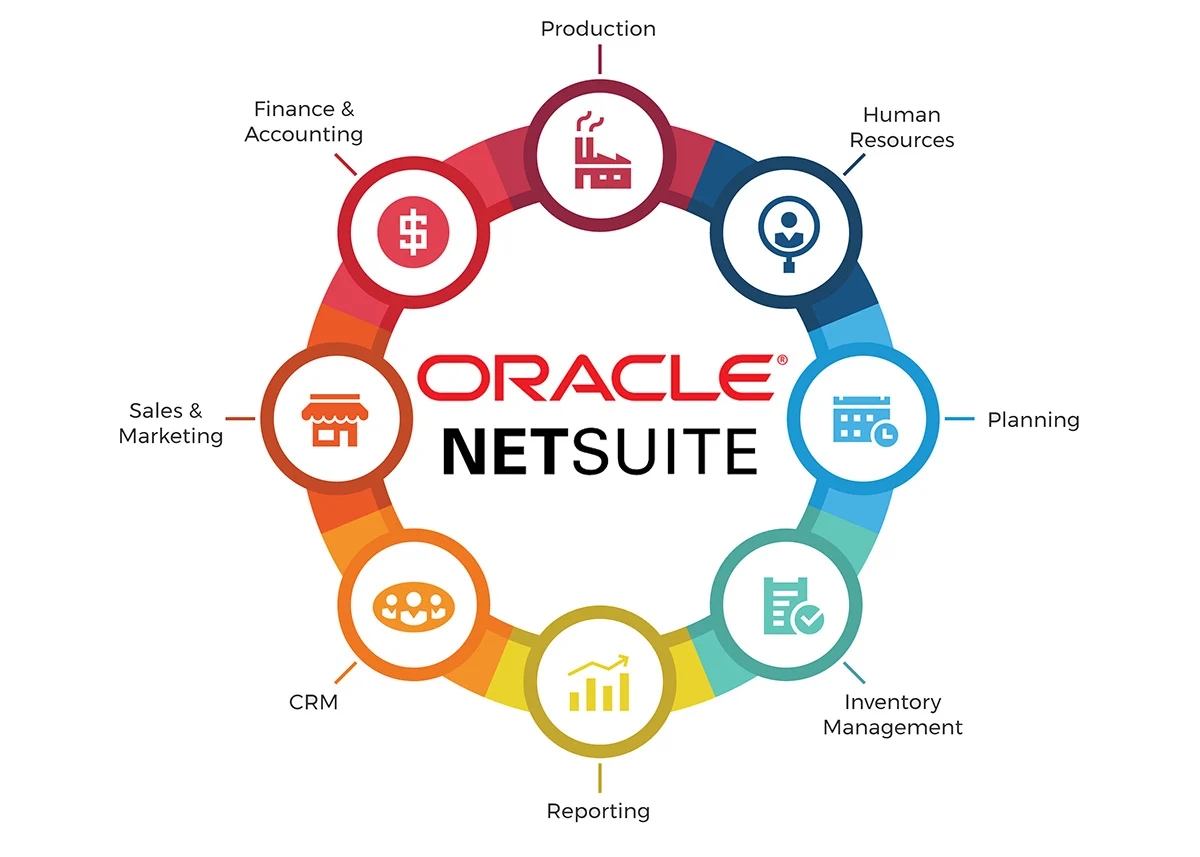
Odoo – Flexible and cost-effective open source platform
Odoo ERP Odoo is an open-source ERP software that comprehensively manages businesses: sales, inventory, CRM, accounting, human resources, production... Odoo stands out thanks to its architecture. flexible module – Businesses can start with a few apps and then gradually expand as needed.
Version distinction: Community vs Enterprise
| Criteria | Odoo Community | Odoo Enterprise |
| License | Completely free, open source | Pay per user/month, source code partially closed |
| Feature | Only basic modules (CRM, Sales, Inventory…) | Add many advanced modules (IFRS standard accounting, Helpdesk, advanced MRP, IoT, advanced HR…) |
| Support | Community contribution, self-handling of errors | Official support from Odoo SA (updates, bugfixes, SLA) |
| Deployment | Suitable for startups, small SMEs, and self-installation by IT teams | Suitable for medium and large businesses that require stability and professional support services |
| Hosting | Self-hosted (on-premise or private cloud) | You can choose Odoo.sh (cloud operated by Odoo) |
Unique Features of Odoo (Rare Attribute)
- Open source philosophy: Odoo is one of the few modern ERPs that allows deep customization thanks to open source, giving businesses full control over data and processes.
- Extremely user-friendly interface: Odoo's interface is designed to be similar to an e-commerce or social network app – intuitive and easy to use even for non-tech-savvy employees.
- “On-demand” deployment: It is not required to buy the entire ERP package, businesses can start small (for example, just CRM + Sales) and then expand as they grow.
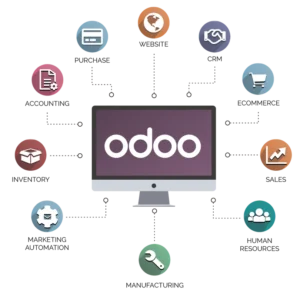
SAP, Odoo and Oracle In-Depth Comparison: Analyzing Core Aspects
When choosing an ERP system, the three most popular names on the market are software SAP, Odoo and OracleEach platform has its own strengths and limitations, suitable for different business sizes.
| Aspect | SAP (S/4HANA / ECC / Business One) | Oracle (NetSuite / E-Business Suite) | Odoo (Community / Enterprise) |
| Target audience | S/4HANA: Corporation, multinational; ECC: enterprise legacy; Business One: SME | NetSuite: SME & scale-ups; EBS: corporate, complex on-prem | Community: small SME / dev-led; Enterprise: SME → mid-market |
| Foundation | On-prem / Private cloud / SAP Cloud (S/4) | NetSuite: Cloud native; EBS: On-prem/hybrid | Community: self-host; Enterprise: Odoo.sh/cloud |
| Price model | License + infra + services (or subscription for S/4 Cloud) | NetSuite: subscription; EBS: license + infra + services | Community: free (OSS) + services; Enterprise: subscription + services |
| 3-year TCO (USD, estimated by scale) | S/4HANA (enterprise): $3,000,000 – $30,000,000
ECC (legacy): $1,500,000 – $12,000,000 Business One (SME): $30,000 – $250,000 |
NetSuite (SME): $30,000 – $600,000
E-Business Suite (enterprise): $1,000,000 – $8,000,000 |
Community (SME, self-host): $5,000 – $50,000
Enterprise (cloud + services): $10,000 – $300,000 |
| Deployment time (typical) | S/4: 12-36+ months; ECC migration: 12-30 months; Business One: 2-6 months | NetSuite: 2-9 months (SME); EBS: 9-24 months | Community: 1-3 months (basic) → 3-9 months (custom); Enterprise: 2-6 months |
| Complexity & manpower required | Very high – solution architects, ABAP/Java, basis, data migration, change mgmt | Mid → high: cloud integrators (NetSuite), PL/SQL/Java/Integration dev for EBS | Low → medium: Python dev, Odoo Studio/low-code; less cumbersome |
| Customization capabilities | Very high, enterprise-grade (but expensive & upgrade-heavy) | Very high; many APIs, Integration Cloud | Highly flexible due to open source; low-code/no-code (Odoo Studio) – rare |
| Integration capabilities | Very good (SAP PI/PO, CPI, Ariba, 3rd party) – complex | NetSuite: many connectors & SuiteTalk APIs; EBS: powerful, needs middleware | Easy to integrate via API, module community; need dev to scale |
| Interface / UX | Modern S/4HANA Fiori; sophisticated traditional ECC | NetSuite UX cloud friendly; EBS legacy | Friendly, intuitive interface – quick to learn & easy to use (rare attribute) |
| Finance – Accounting (core) | Full GL, Subledgers, consolidation, multi-ledger, advanced tax, IFRS, consolidation, fixed assets | Full GL, Subledger (EBS R12), multi-book, strong cash/treasury | GL, AR, AP, reconciliation, multi-company (Enterprise); enterprise features need additional modules |
| AP (Accounts Payable) Management | Enterprise-grade: OCR + invoice-management (OpenText/SAP IM), 2/3-way match with MM integration, payment factory, multi-entity settlement, strong audit controls | NetSuite: cloud AP + SuiteApps (OCR, 2/3-way match), payment runs, bank formats; EBS: Strong AP, integrated payment formats & treasury | Odoo: vendor bills, 2-way/3-way matching (Enterprise), reconciliation, payment orders; OCR & e-invoice require add-ons or customization; easy to customize but lacks out-of-box readiness for large payment factories |
| Security & Compliance | Enterprise-grade, multiple certifications, localization support | NetSuite: cloud security; EBS: depends on infra | Good with correct configuration; depends on deployment & hosting |
| Main advantages | Scale, enterprise features, governance, compliance | NetSuite: fast cloud rollout; EBS: mature & customizable | Low cost, fast deploy, good UX, open source & low-code |
| Main disadvantages | High cost and time; complex upgrades | NetSuite: subscription costs gradually increase; EBS: legacy complexity | Lack of 1-click enterprise features (must be customized), large scaling requires serious management |
| When to choose | Multinational organization, complex processes, large volume | NetSuite: fast-growing SMEs want cloud; EBS: legacy enterprise | SME cost-sensitive, want to control code & quickly change features |
Blind Spot Analysis: Gaps in the Process Cost Management of large ERPs
Although ERP systems like SAP, Oracle, Odoo are considered the backbone of business administration, they still have a significant gap in automating back-office processes.
- ERP focuses on recording data, not optimizing the processing of each document.
- Input invoice processing (AP): usually still requires manual data entry, review, manual or semi-automatic 3-way matching → potential errors, delays, and risks of late payment penalties.
- Expense & expense management: approval workflows in ERP are often complex, less flexible, and difficult to set up real-time over-budget expense alerts.
In short, the software Oracle SAP or Oddo Despite its comprehensiveness, businesses still spend many hours processing paperwork, are prone to duplicate invoices, and have difficulty getting an immediate picture of costs. This is where “deeper automation” is needed to free up resources.
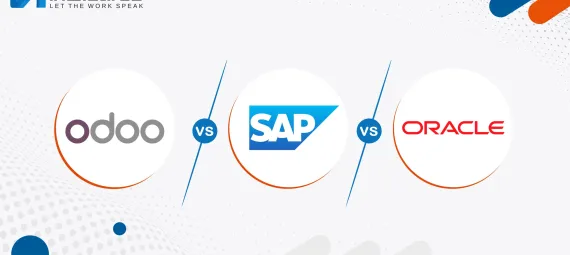
The solution to the cost problem: Integrate specialized solutions like Bizzi.vn
Customers with ERP, Bizzi is not a replacement but a smart addition to the software. Oracle SAP or Oddo, helping to further automate back-office processes and minimize manual errors. Bizzi.vn solution specifically addresses the challenges:
- Processing input invoices:
- AI + RPA automatically recognizes and enters invoices in multiple formats (PDF, XML, scanned documents).
- 3-way automatic matching (PO – GR – Invoice): matches purchase orders, warehouse receipts and payment invoices, and detects discrepancies in price, quantity or duplicate invoices.
- Automatically push clean data to ERP (SAP/Oracle/Odoo): eliminate repetitive manual operations, helping businesses save more than 80% of document processing time compared to the traditional way.
- Spending & Budget Control: One of the major challenges for businesses is managing costs according to real-time instead of waiting until the end of the accounting period. Bizzi.vn helps:
-
- Set up flexible budgets for each department, project, or cost center in real time.
- Compare expenses with approved budget: the system automatically warns when spending exceeds the limit, limiting the situation of "overspending beyond control".
- Intuitive Dashboard for CFO & Procurement: provides instant visibility into all costs, instead of having to wait until “closing the books” to summarize.
In particular, Bizzi.vn uses AI + RPA for automatic 3-way matching, while providing real-time budget control - something that most ERPs do not have or are very expensive to implement.
- Benefits of Bizzi Seamless and comprehensive integration of ERP systems:
- Retains core ERP features, flexible and easily configured to fit your business's current accounting and purchasing processes.
- Increase the ability to “deepen automation” of back-office processes that ERP does not optimize; leverage the power of automation without affecting the way you work.
- Reduce TCO compared to heavy ERP expansion or customization
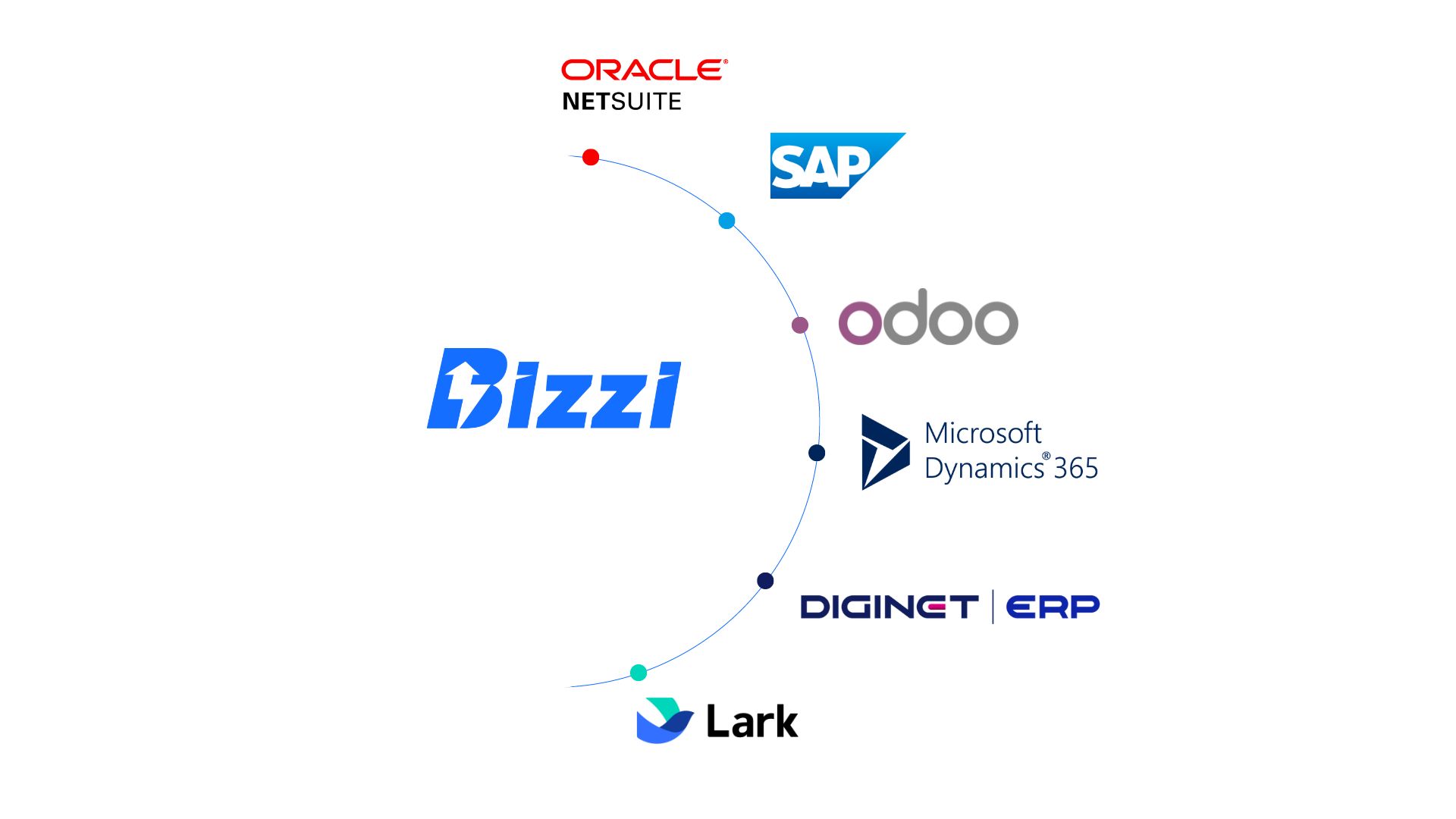
Oracle SAP, Odoo software is suitable for which types of businesses?
Depending on the business model and needs, the decision to choose Oracle SAP or Odoo software will have its own advantages and disadvantages.
For Enterprise
Recommended options: SAP S/4HANA or Oracle E-Business Suite / Oracle NetSuite
- Reason for choosing:
- Support multi-entity, multinational, compliance with international accounting standards (IFRS, US GAAP).
- Respond to complex processes: supply chain management, intercompany, cash flow management and consolidation.
- Highly customizable and scalable, suitable for global strategy.
- Important Note:
- High TCO, long implementation time, need experienced implementation team.
- Should integration with complementary solutions (Example: Bizzi.vn) to “further automate” back-office processes such as invoice processing and expense control. This helps shorten closing times, reduce manual errors, and speed up decision making.
For Small and Medium Enterprises (SMEs)
Recommended choice: Odoo Enterprise or SAP Business One
- Reason for choosing:
- Fast deployment, reasonable cost, suitable for businesses that need to expand but do not want to invest heavily in ERP.
- Odoo Outstanding with friendly interface, easy to use, highly customizable thanks to open source code, very suitable for SMEs who want flexibility.
- SAP B1 Suitable for SMEs that are familiar with SAP standards and need an early standardization solution to scale later.
- Optimal strategy:
- Start with a lightweight ERP platform, simultaneously combining specialized solutions for key financial processes (AP automation, budget control) from the start.
- This way helps businesses good control of operating costs, avoid falling into the trap of “costly ERP upgrades” when scaling.
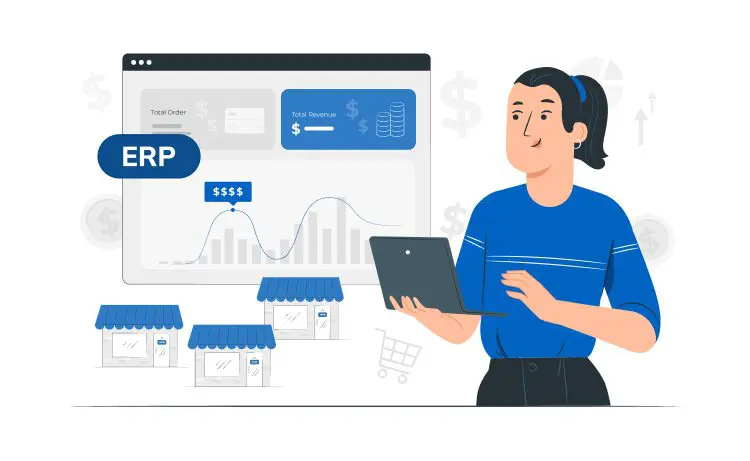
Frequently Asked Questions (FAQs)
Should I learn SAP or Oracle or Odoo to develop my career?
Oracle SAP and Odoo are both popular ERP platforms, but your career path depends on your goals. SAP and Oracle are suitable for large enterprises, require specialized knowledge, and often offer higher income. Meanwhile, Odoo is more accessible, suitable for startups or SMEs, and has a large community. Advice: If you want to work at a multinational corporation → choose SAP/Oracle; if you are flexible and entrepreneurial → learn Odoo.
Can ERP be integrated with other software?
Yes. Modern ERP systems such as SAP, Oracle, Odoo all support integration with accounting software, CRM, HRM or financial automation applications such as Bizzi.vn. This integration helps synchronize data, reduce manual errors and optimize business management efficiency. Thanks to that, ERP is not only an internal management tool but also becomes a central data platform.
What are the benefits of digital transformation with ERP?
Digital transformation with ERP helps businesses standardize processes, reduce operating costs and increase financial control efficiency. In addition, ERP provides centralized data, supports analysis and faster decision making. Businesses can improve customer experience, optimize supply chains and enhance long-term competitiveness thanks to ERP applications in the digital transformation journey.
Conclude
In general, Oracle SAP and Odoo software both have their own advantages and disadvantages. If the software Oracle SAP strong in complex processes (multi-entity, multinational, IFRS/GAAP standards) Odoo Flexible for SMEs, helping to standardize from the beginning without huge costs. Reduce manual operations, reduce data entry errors, increase operational productivity.
Once they grasp the nature and understand the problem the business is facing, it will be easier for managers to choose software to solve the current problem.
Digital transformation with ERP not only helps businesses optimize processes and make quick decisions, but also creates an open platform to connect with complementary solutions such as Bizzi.vn thereby maximizing operating efficiency and reducing costs.

